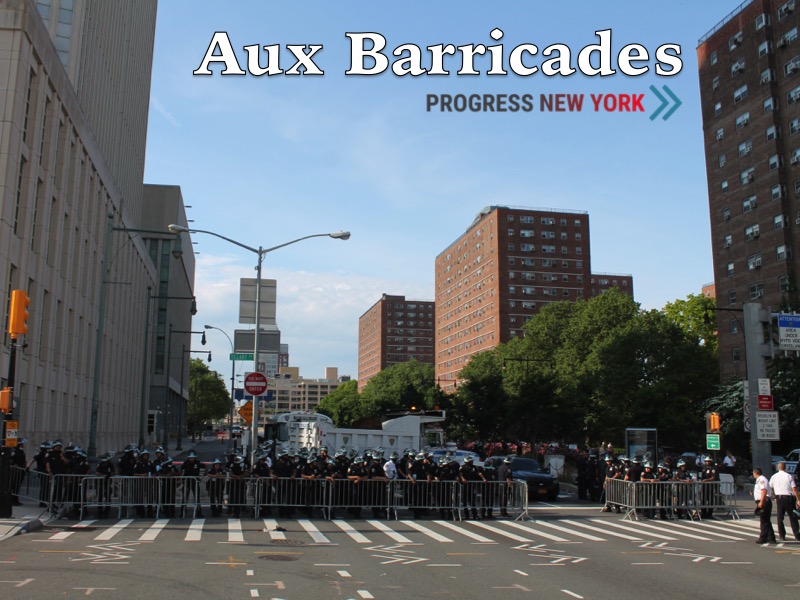The controversial curfew, first set at 11 pm, was moved up to 8 pm. Nonprofit groups threatened litigation after activists had been brutalised by police for violating the curfew.
Under multiple threats of litigation made on Friday over Constitutional rights breaches rooted in a contentious 8 pm nightly curfew meant to curtail the widespread public demonstrations against racism and police brutality, Mayor Bill de Blasio (D-New York City) announced on Twitter on Sunday morning that he was ending the curfew one day early following a long night of protests that largely remained benign. The curfew, which had been set to expire after Sunday evening upon an extension of an Executive Order, was terminated under heavy political and legal pressure.
An immigration group had threatened on Friday to sue the City if Mayor de Blasio didn’t immediately lift the controversial 8 pm nightly curfew. Separately, the Legal Aid Society and other groups had signaled an intent to sue the City if Mayor de Blasio had extended the curfew.
In an apparent response to the litigation threats, the New York Police Department, tasked with enforcing the curfew, reportedly only made 40 arrests overnight Friday, an 85 per cent. drop from the night before, when 270 arrests were made, according to a report published by the New York Post.
A public rebellion had taken the shape of protest marches and rallies that had, at times, shut down City streets and some of the East River crossings, overwhelmed parks, and resulted in at least some property damage. The mayor had instituted the curfew, originally set for 11 pm, with effect on the fifth night of civil unrest on Monday, June 2. The following day, the curfew was moved up to 8 pm in a deliberate effort to neuter the protest movement that had formed in response to the police killing of George Floyd in Minneapolis on May 25.
Arrests of activists participating in New York City anti-racism protests have exceeded the number of arrests made during the 2004 Republic National Convention.
The City has a long history of using unconstitutional means to undermine mass social movements, so much so that it has been subjected to an ineffectual, decades-long Court supervision in litigation known as the Handschu case. Prior to the current popular uprising against racism and police brutality, the City had used force, made unlawful arrests, and unlawfully detained individuals during prior flashpoints of conflict, such as during the Occupy Wall Street movement and during the violent Republican National Convention, which the City hosted in 2004. It took almost 10 years for the City to settle the lawsuits filed in connection with the 2004 RNC abuses, according to a report published by the New York Daily News. At that time then, New York Civil Liberties Union lawyer Christopher Dunn had told the Daily News, “We will not allow the police to trample on the First Amendment rights of protesters.” This time, though, the NYCLU waited until the last Business Day before the week-end on which curfew was set to expire before it threatened legal action against Mayor de Blasio.
As of last Thursday evening, it was reported that over 2,500 individuals had been arrested in connection with the mass uprising protesting racism and police brutality, more than the 1,800 arrests made by the NYPD during the 2004 RNC.
Since many of the arrests made by the NYPD deal with the free expression and free assembly rights of citizens, District Attorney Cyrus Vance, Jr. (D-New York) announced that he wasn’t going to press charges for curfew violations, according to a report moved by NPR.
Allegations of Constitutional, Federal civil rights, and civil liberties violations by the police give rise to one question : How can Federal law enforcement consent to these violations ?
In the latest public uprising, the NYPD had been caught arresting at least eight legal observers at one Bronx protest gathering alone, on Thursday night, according to a report published by Gothamist. Legal observers are typically civil liberties and civil rights lawyers, who monitor police abuse of power.
The allegations of First Amendment rights violations also included threats by the NYPD to revoke press passes and the suspension of processing press pass applications. In New York City, the police department arm of Government unlawfully attempts to control the free press by determining which journalists receive press credentials.
As reported by Progress New York, questions exist about the seemingly discretionary enforcement of Constitutional, Federal civil rights, and civil liberties of activists and the contradictory swift response by law enforcement to arrest activists. Before law enforcement can mobilise responses to allegations of Federal crimes, law enforcement Agencies, such as the NYPD, must show “close cooperation and coördination” with the U.S. Attorneys’ Offices and the U.S. Department of Justice to ensure successful prosecution of cases, according to the Attorney General’s Guidelines for Domestic FBI Operations. However, given the NYPD’s history of violating Constitutional rights, it has been left unexplained how U.S. Attorney Richard Donoghue could have been consulted about the NYPD’s massive deployment that led to allegations of violent acts and rights violations by police officers across Brooklyn, including near the doorstep of the U.S. Attorney’s Offices at Cadman Plaza. For this report, the office of U.S. Attorney Donoghue declined to comment.
Manhattan, the Bronx, and Westchester are in the jurisdiction of U.S. Attorney Geoffrey Berman, whose office declined to comment for this report. If the Manhattan District Attorney’s Office knew to decline to prosecute arrests for curfew violations, it’s not known why U.S. Attorney Berman would have consented to granting the NYPD such authority. The U.S. Attorney’s Office has thus far not addressed allegations of corruption in the Mount Vernon police department, which is also in its jurisdiction.

